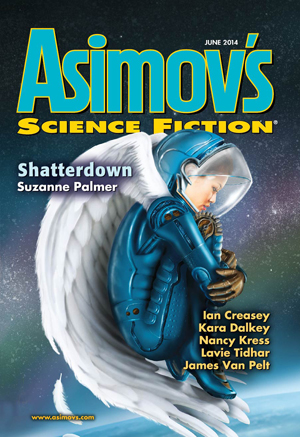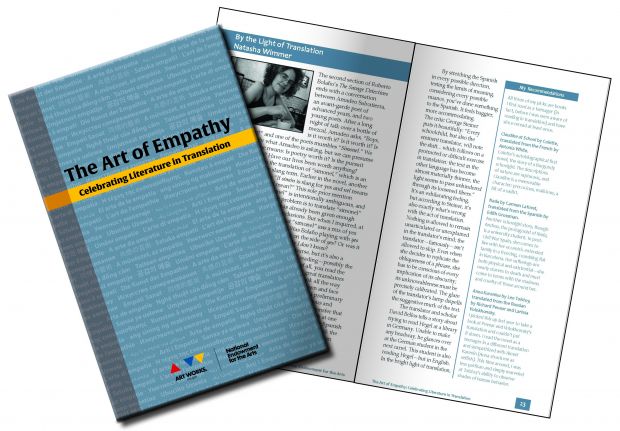August 31st, 2014 § § permalink

Wilfried N’Sondé, a musician living in Berlin, is the author of three books: the highly acclaimed CÅ“ur des enfants léopards (2007), for which he was awarded the prix des Cinq Continents de la francophonie and the Prix Senghor de la création littéraire; Le Silence des esprits (2010); and most recently, Fleur de béton (2012), from which the excerpt “Flowers in Concrete” at Words Without Borders is taken.
Here’s a preview, pre-urban riot:
“Evening, everyone. I’m Captain Moussa Traoré of the National Police. This is my colleague Lieutenant Da Silva. No music tonight: the mayor’s office, in conjunction with the police, has decided to seal the entrance to the basement for the well-being of local residents. It’s for your own safety and security; the facilities below are not up to standard for public festivities. You probably don’t even know, but spending hours down there is toxic. The air isn’t good for you—throw in cigarettes on top of that and it’s a clear health hazard. Why don’t you head out to a real nightclub? This is just a public nuisance.â€
August 30th, 2014 § § permalink

In the June issue of Asimov’s, my first translation in that august staple of all things SFnal: Sylvain Jouty’s “The Finges Clearing.†A member, like Georges-Olivier Châtaureynaud, of the French literary movement “La nouvelle fiction,†Jouty’s first story in English came out last January in the mountaineering magazine Alpinist: “The Wall,†a Calvino-esque tale about a vertical world (Jouty himself is a natural historian and climber, former editor of Alpinisme et Randonnée.
Here’s an excerpt:
“Of all the virgin territories, dwindling daily, that subsist on this cramped planet—a few mountain tops, a few acres of primeval forest—the Finges Clearing is the most surprising and the least known, precisely because it perfectly resembles the perfectly known territory around it. It is the most remarkable because there is absolutely nothing remarkable about it.”
Chuck Rothman at Tangent Online calls the story “a vignette about a small area in the forests around a small town with a unique history… pure idea, with a bit of ironic commentary on how tourists behave.â€Â Joe Martin at Minor Thoughts highlights the story’s “very nice natural history tone… that reminded me a lot of Jules Verne,” while Sam Tomaino at SFRevu calls it a “beautiful, lyrical piece.†Glad that came through in translation!
Buy it here or discuss it here!
August 29th, 2014 § § permalink

At the newly redesigned Irreal Café, a kind review by Greg:
“The stories themselves are quite brilliant. As this is but a short review, I will attempt to describe Ferry’s stories succinctly but imperfectly by stating that they present a reality being pushed by the circumstances described in the story and the narrator’s reflections on those circumstances to the breaking point and then, inevitably, past it.â€
At The Mooske and The Gripes, Trevor Berrett calls The Conductor “a beautiful, compact book, and slipping in and out of each tale is a delight, even if the stories explore some of the darker areas of our mind.â€
Finally, Matt Pincus at Necessary Fiction writes:
“At times transgressive, and at others with a Poe-like Gothic, the stories are also ironically mythical, creating a juxtaposition of nuance and beauty.
These 25 stories have transient, wandering elements in which characters inhabit a place somewhere between fact and fiction, history and illusion, dream and reality of an eerie murkiness…
There is a ghostly, ethereal quality to each tale, which, as the collection progresses, become darker and phlegm-like. A tale not part of the original collection is of a man on a mountain expedition who loses his partner climbing an ice sheet, but seems to be only clinging a few feet off the floor in someone’s home. Each story shifts between admiration for spectacle, and violence or mortal danger within that spectacle. As any excellent story collection, the tension vibrates at unexpected moments, and the language expands, or crests at moments of insight to allow the reader’s creativity to see a new perception of their own imagination.”
August 28th, 2014 § § permalink
Congratulations to this year’s NEA Literary Translation Fellows! I was proud to serve on the panel this year, and let me tell you, there were some tough calls to be made.

In concert with this announcement, the NEA has also released an anthology of original essays by award-winning translators and publishers, aptly entitled The Art of Empathy. These nineteen thoughtful essays consider the art of translation and its ability to help us understand other cultures and ways of thought. The book is available as a free pdf download.
In addition, on Saturday, August 30, 2014 from 10:55 a.m.–11:40 a.m. at the National Book Festival, the NEA-sponsored Poetry & Prose tent will feature a panel discussion on books in translation with author-translator Paul Auster and Natasha Wimmer (Roberto Bolaño’s translator). Moderated by Amy Stolls, the panel will discuss the art of translation and its role in the literary world. More information about the authors appearing at the Poetry & Prose tent can be found here.
August 27th, 2014 § § permalink

The good folks at The Collagist have seen fit to bring you in their July issue my translation of “The Great Pity of the Zintram Family†by Belgian fabulist Anne Richter. I’ve written about before Richter at Weird Fiction Review and for Not a Journal, the Small Beer Press blog. To celebrate this happy publication, here’s a preview from the story, a kooky dinner prayer:
O Fire! Tonight we bring you our watery dreams.
Wring them, dry them, destroy them.
Water speaks of sleep and death, but we want life.
Be our watcher and our guardian, our father and soldier.
Protect the parents from the children and the children from themselves.
Heal our little Arthur,
Guide his steps through the house, through the meadow, to the pond’s edge.
Forgive us our sins as we forgive those who have sinned against us.
Enlighten us, warm us, keep the waters from this house.
So be it.
August 25th, 2014 § § permalink
My last two pieces for the venerable Gray Lady:
“As time passed, a vanguard of talented mixed-race players began gaining acceptance to some teams; to minimize racist insults and physical abuse from opponents and spectators in 1914, Carlos Alberto of Fluminense is said to have lightened his face by daubing it with rice powder. Others, like the legendary Arthur Friedenreich in the first third of the 20th century, would smooth their hair down with Brilliantine.â€
“For decades in France, that Resistance victory — the universalist spirit of progress and the Enlightenment triumphing over the herd-like, xenophobic spirit of Vichy — put everyone who had collaborated with Nazism outside the legitimate political and moral field. And even though the Resistance was far less united than had been imagined during the war, it had been united enough to reach agreement in March 1944 on a farsighted program of national reconstruction as the principal war aim.”




